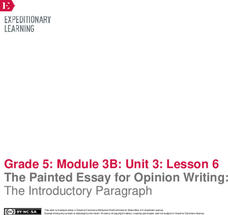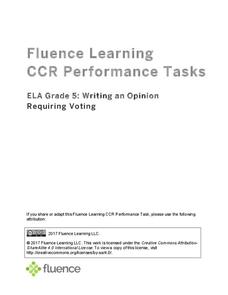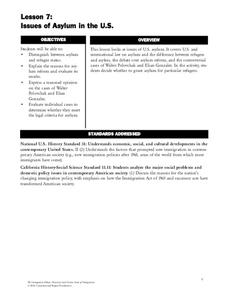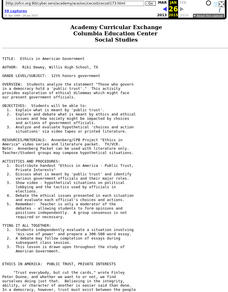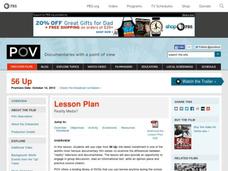Fluence Learning
Writing an Opinion: Student Council
A three-part assessment challenges scholars to write opinion essays covering the topic of the student council. After reading three passages, writers complete a chart, work with peers to complete a mini-research project, answer...
EngageNY
The Painted Essay for Opinion Writing: The Introductory Paragraph
The answer is blowin' in the wind. Using the resource, scholars read and analyze a model essay about wind power. Next, they work in groups to write an introductory paragraph that expresses an opinion about the topic.
Fluence Learning
Writing an Opinion Requiring Voting
Challenge writers to compose an essay detailing their stance on, and the history of, voting. Three assignments, each broken down into three parts, requires fifth graders to take notes, read and complete charts, write paragraphs, compare...
Portland Public Schools
Opinion: Persuasive Essay Unit Introduction
Opinion, audience, purpose. Fourth graders are introduced to the three characteristics of persuasive writing in the third unit of a year-long writing program. The 98-page packet is complete with plans, model essays, graphic organizers,...
Constitutional Rights Foundation
Issues of Asylum in the U.S.
Who gets to come to the United States? Examine cases of individuals seeking asylum with an informative reading passage that includes examples, statistics, and representations of public opinion regarding asylum. Groups then go on to...
Michigan Association of Intermediate School Administrators
Persuasive Essay: Grade 5
Improve your fifth graders' persuasive writing skills in four weeks. Working independently, in peer editing groups, and with instruction, writers work over the 17 sessions to craft an argumentative essay. They craft a...
Social Media Toolbox
Ethical Decision Making
When faced with a dilemma, how do journalists decide how much news to use? Social media scholars explore the philosophies of ethical resolution in the first of a 16-part Social Media Toolbox series. Partnered pupils use a Potter Box to...
K20 LEARN
Introduction to Arguing Effectively: Argument Writing
Which is better—Chick-fil-A or MacDonalds? High schoolers learn how to craft an argument essay by beginning an opinion statement. They state a claim, back up their claim with evidence, and consider counter calms. Scholars then create a...
Novelinks
Walk Two Moons: Anticipation Guide
Before you begin a unit on Sharon Creech's Walk Two Moons, introduce class members to the literary themes of the book with an anticipation guide. As they read through ten sentences that address different aspects of the plot,...
Curated OER
The Boy in the Striped Pajamas: Anticipation Guide
Let your learners voice their opinions on morals and human rights with an anticipation guide for Asa Butterfield's The Boy in the Striped Pajamas. Before reading the novel, kids read several statements that encourage them...
EngageNY
Revising Draft Letters to a Publisher about an Athlete’s Legacy: Critique and Feedback, Part I
Pick a corner, any corner! Pupils use the Four Corners strategy and Peer Critique protocol to assess one another's draft letters to a publisher about an athlete's legacy. Scholars then use peer feedback to revise their letters.
Bright Hub Education
Using Evidence and Supporting Details in Writing
In expository writing, it is important to back up claims with evidence and details. Help your class to develop their writing with notes on different types of evidence. Once they have the basics down, practice with a sample thesis and...
Curated OER
Ethics in American Government
Engage 12th graders in a series of activities focused on public trust and ethics in US Government. They view a series of videos, hold a class debate, and compose a short essay. Note: Suggested videos are listed but are not available...
Curated OER
Shaking the Movers: Youth Rights and Media
Children have rights! Exploring those rights and using media to express those rights is the focus of this Media Awareness Network lesson. Although some of the law links reflect the Canadian Articles of The Convention, the majority of the...
Novelinks
The True Confessions of Charlotte Doyle: Problematic Situations
When is it okay to go against authority and what can happen if you do? This is the leading question in this activity to accompany your classroom reading of The True Confessions of Charlotte Doyle by Avi. After reading...
Curated OER
Reality Media?
Yeah, but is it real? Clips from the famous documentary film series 56 UP launches an examination of the differences between reality television and documentaries. After considering the characteristics of each format, class members...
Council for the Curriculum, Examinations and Assessment
Safety and Managing Risk
Teenagers love to take risks to test their personal boundaries, but many risks are too dangerous to try. The set of exercises in this packet teach your class about the ways they can stay safe and protect themselves while still having fun.
Curated OER
Nonfiction Genre Mini-Unit: Persuasive Writing
Should primary graders have their own computers? Should animals be kept in captivity? Young writers learn how to develop and support a claim in this short unit on persuasive writing.
San Bernardino Co. Supt. of Schools
Was Julius Caesar a Good Leader for Rome?
Learners consider the various perspectives that different groups in Roman society may have had for Julius Caesar, such as Roman soldiers, senators, the working class, and slaves. The primary activity involves a reading of Caesar's...

